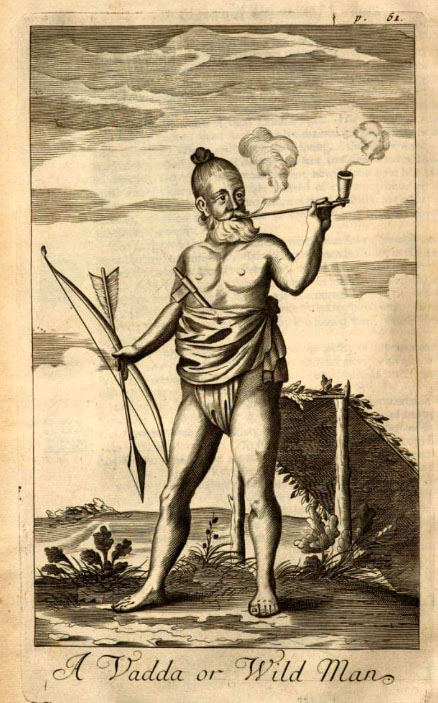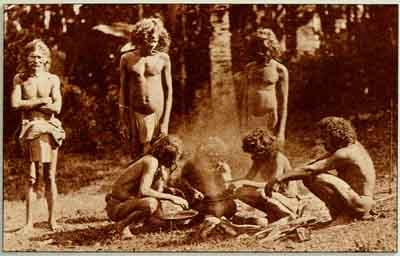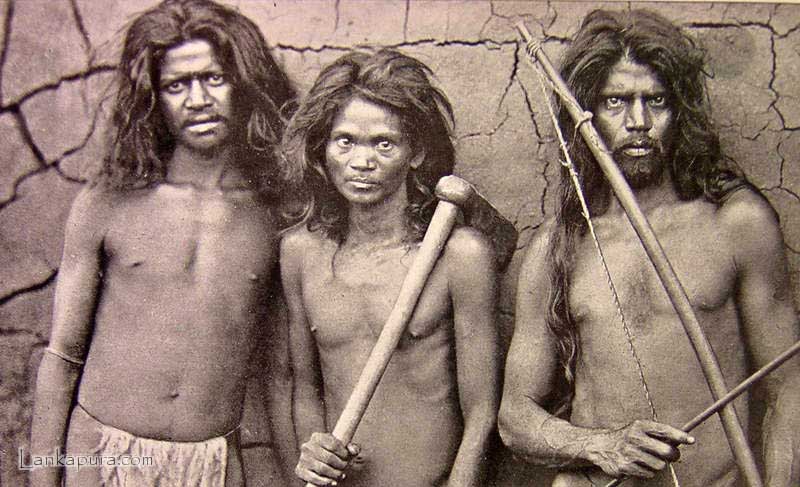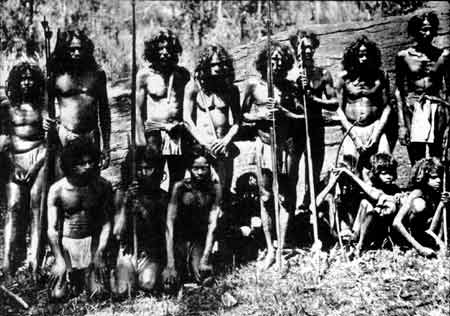
An Historical Relation of the Island Ceylon by Robert Knox (1681) p.60.
To Robert Knox, who wrote in 1681 after a captivity in Ceylon lasting twenty years, belongs the credit of having first accurately described the Veddas:
“Of these Natives there be two sorts Wild and Tame. I will begin with the former. For as in these Woods there are Wild Beasts so Wild Men also. The Land of Bintan is all covered with mighty Woods, filled with abundance of Deer. In this Land are many of these wild men; they call them Vaddahs, dwelling near no other Inhabitants. They speak the Chingulayes Language. They kill Deer, and dry the Flesh over the fire, and the people of the Countrey come and buy it of them. They never Till any ground for Corn, their Food being only Flesh. They are very expert with their Bows. They have a little ax, which they stick by their sides, to cut hony out of hollow Trees. Some few, which are near Inhabitants, have commerce with other people. They have no Towns nor Houses, only live by the waters under a Tree, with some boughs cut and laid about them, to give notice when any wild Beasts come near, Which they may hear by their rustling and trampling upon them. Many of these Habitations we saw when we fled through the Woods, but God be praised the Vaddahs were gone.
“Some of the tamer sort of these men are in a kind of Subjection to the King. For if they be found, tho it must be with a great search in the woods, they will acknowledge his Officers, and will bring to them Elephant-teeth, and Honey, and Wax, and Deer’s Flesh; but the others in lieu thereof do give them near as much, in Arrows, Cloth, etc. fearing lest they should otherwise appear no more.

“It had been reported to me by many people, that the wilder sort of them, when they want Arrows, will carry their load of Flesh in the night, and hang it up in a Smith’s Shop, also a Leaf cut in the form they will have their. Arrows made, and hang by it. Which if the Smith do make according to their Pattern they will requite, and bring him more Flesh: but if he make them not, they will do him a mischief one time or another by shooting in the night. If the Smith make the Arrows, he leaves them in the same place, where the Vaddahs hung the Flesh.
“About Hourly the remotest’ of the King’s Dominions there are many of them, that are pretty tame, and come and buy and sell among the people. The King once having occasion of an hasty Expedition against the Dutch, the Governour summoned them all in to go with him, which they did. And with their Bows and Arrows did as good service as any of the rest but afterwards when they returned home again, they removed farther in the Woods, and would be seen no more, for fear of being afterwards prest again to serve the King.
They never cut their hair but tye it up on their Crowns in a bunch. The cloth they use, is not broad nor large, scarcely enough to cover their Buttocks. The wilder and tamer sort of them do both observe a Religion. They have a God peculiar to themselves. The tamer do build Temples, the wild only bring their sacrifice under Trees, and while it is offering, dance round it both men and women.
“They have their bounds in the Woods among themselves, a one company of them is not to shoot nor gather hony or fruit beyond those bounds. Neer the borders stood a Jack Tree; one Vaddah being gathering some fruit from this Tree, another Vaddah of the next division saw him, and told him he ad nothing to do to gather Jacks from that Tree, for that belonged to them. They fell to words and from words to blows, and one of them shot the other. At which more of them met and fell to skirmishing so briskly with their Bows and Arrows, that twenty or thirty of them were left dead upon the spot.

“They are so curious of their Arrows that no smith can please them: The King once to gratifie them for a great Present they brought him, gave all of them of his best made Arrow-blades: which nevertheless would not please their humour. For they went all of them to a Rock by a River and ground them into another form. The Arrows they use are of a different fashion from all other, and the Chingulays will not use them.

“They have a peculiar way by themselves of preserving Flesh. They cut a hollow Tree and put honey in it, and then fill it up with flesh, and stop it up with clay. Which lyes for a reserve to eat in time of want.
“It has usually been told me that their way of catching Elephants is, that when the. Elephant lyes asleep they strike their ax into the sole of his foot, and so laming him he is in their power to take him. But I take this for a fable, because I know the sole of the Elephants foot is so hard, that no axe can pierce it at a blow; and he is so wakeful that they can have no opportunity to do it.
“For portions with their Daughters in marriage they give hunting Dogs. They are reported to be courteous. Some of the Chingulays in discontent will leave their houses and friends, and go and live among them, where they are civilly entertained. The tamer sort of them, as hath been said, will sometimes appear, and hold some kind of trade with the tame Inhabitants, but the wilder called Ramba Vaddahs never show themselves.”
From Knox’s account it is evident that in his time or a little before this, some of the Veddas were in touch with the court and were even sufficiently amenable to discipline to be of use as an auxiliary fighting force, indeed, there is abundant evidence that long before this a part of the inhabitants of Ceylon, with enough Vedda blood in them for their contemporaries to call them Veddas, were politically organised and constituted a force whom the rulers of the island found it necessary to consider.